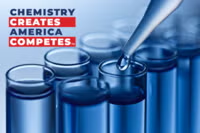WASHINGTON (September 27, 2023) — Today, the American Chemistry Council (ACC) issued a statement ahead of Environmental Protection Agency (EPA) Administrator Michael Regan’s testimony before a hearing of the House Science, Space, and Technology Committee on “Science and Technology at the EPA.” ACC recently launched Chemistry Creates, American Competes: a comprehensive initiative to sound the alarm on troubling regulatory overreach against the chemical industry that jeopardizes Administration priorities, from renewable energy to semiconductor manufacturing.
Chris Jahn, President and CEO of the American Chemistry Council, issued the following statement:
“ACC and its members strongly support responsible regulation that is driven by science, promotes innovation, and supports supply chain resiliency. Unfortunately, EPA’s recent regulatory onslaught against the chemical sector fails to meet these standards.
“We are gravely concerned by a series of unprecedented recent regulatory actions that have demonstrated either a lack of understanding or a lack of appreciation for just how much our industry is essential to advancing American competitiveness. At the heart of the issue is a massive surge in new, unduly restrictive regulations, and a lack of coordination within the Biden Administration that is hindering the chemical industry’s ability to innovate, grow, and create products.
“In fact, we’ve identified more than a dozen proposed restrictions specifically targeting the chemical industry that impose a collective cost to the U.S. economy of close to $7 billion per year using the federal government’s own estimates. Some of these regulations would unnecessarily ban certain chemistries or regulate them at such low levels that manufacturing becomes virtually impossible. Short-sighted regulations threaten to undermine the very policy priorities set forth by laws like the Inflation Reduction Act (IRA), Infrastructure Investment and Jobs Act (IIJA), and CHIPS and Science Act — laws meant to spur American innovation and competitiveness.
“American success relies on American chemistry. Chemistry enables the advanced materials that are crucial ingredients in producing semiconductor computer chips, high-tech automotive parts, healthcare essentials, and building & construction materials – all critical components that drive our supply chain, infrastructure, and renewable energy sources.
“We are calling on Administrator Regan and the Biden Administration to work with us—not against us—to keep strong risk-based protections in place and Americans safe without banning chemistries outright or regulating them at such low levels that American manufacturing is hindered. We must put science first and develop rules and regulations that protect health and the environment without stifling innovation and weakening supply chain resiliency.”
ACC has issued a series of recommendations to the Biden Administration that would help achieve smarter regulation, including:
- The Office of Management and Budget must evaluate all significant rulemaking through the lens of potential impacts to supply chain, trade, national security, energy, climate, healthcare, infrastructure, and innovation.
- The Administration should assign a senior official, preferably in the White House, with economic expertise who can objectively assess the impact of these proposed regulations on the supply chain and the ability to achieve national goals.
- The EPA must be willing to come to the table, put science first, and develop rules and regulations that protect health and the environment without killing innovation, weakening supply chain resiliency, and sending jobs to countries like China.
- Congressional oversight of significant regulations on the chemical sector. Congress must examine how inappropriate EPA regulations on certain chemistries can cut off access to products and technologies needed to support American-made energy, vehicles, infrastructure, healthcare, and semiconductors.
- Finally, Congress should consider legislation to improve the regulatory process, streamline permits, eliminate overly conservative regulations and/or replace those regulations with more flexible, smart, science-based policy approaches.
Learn more at chemistrycreates.org.



